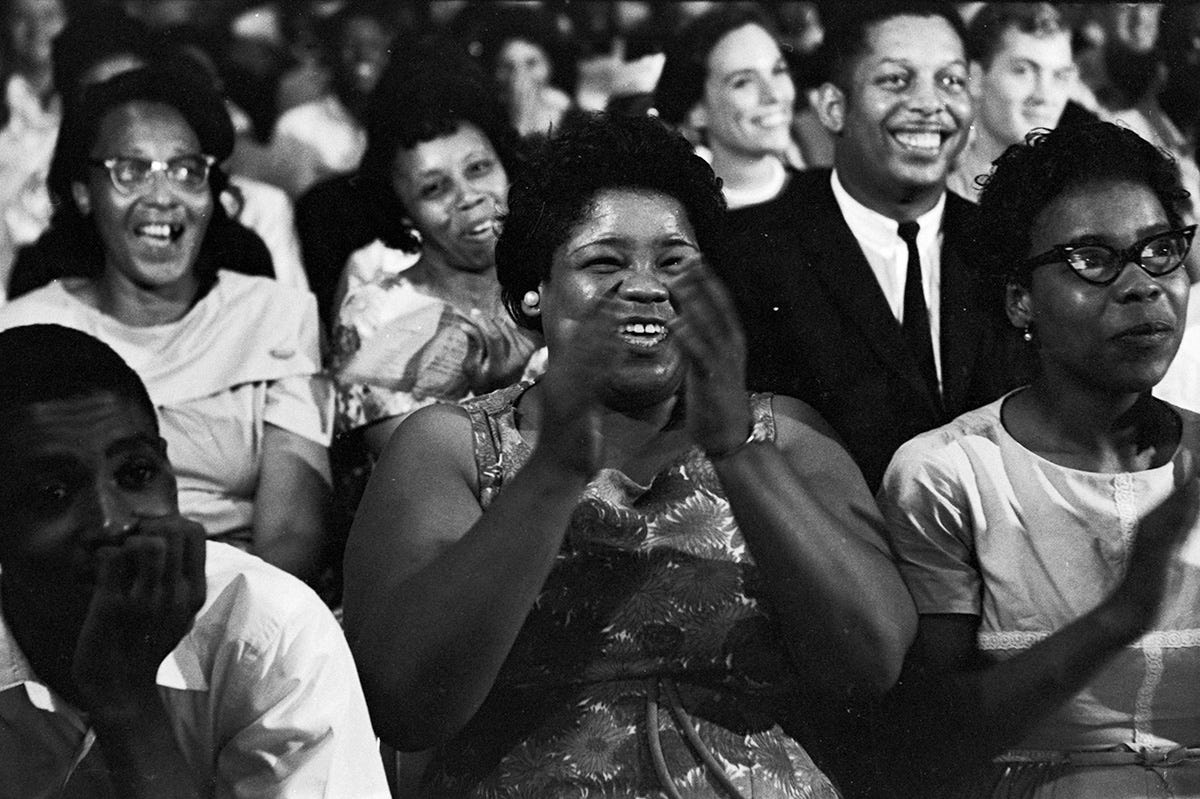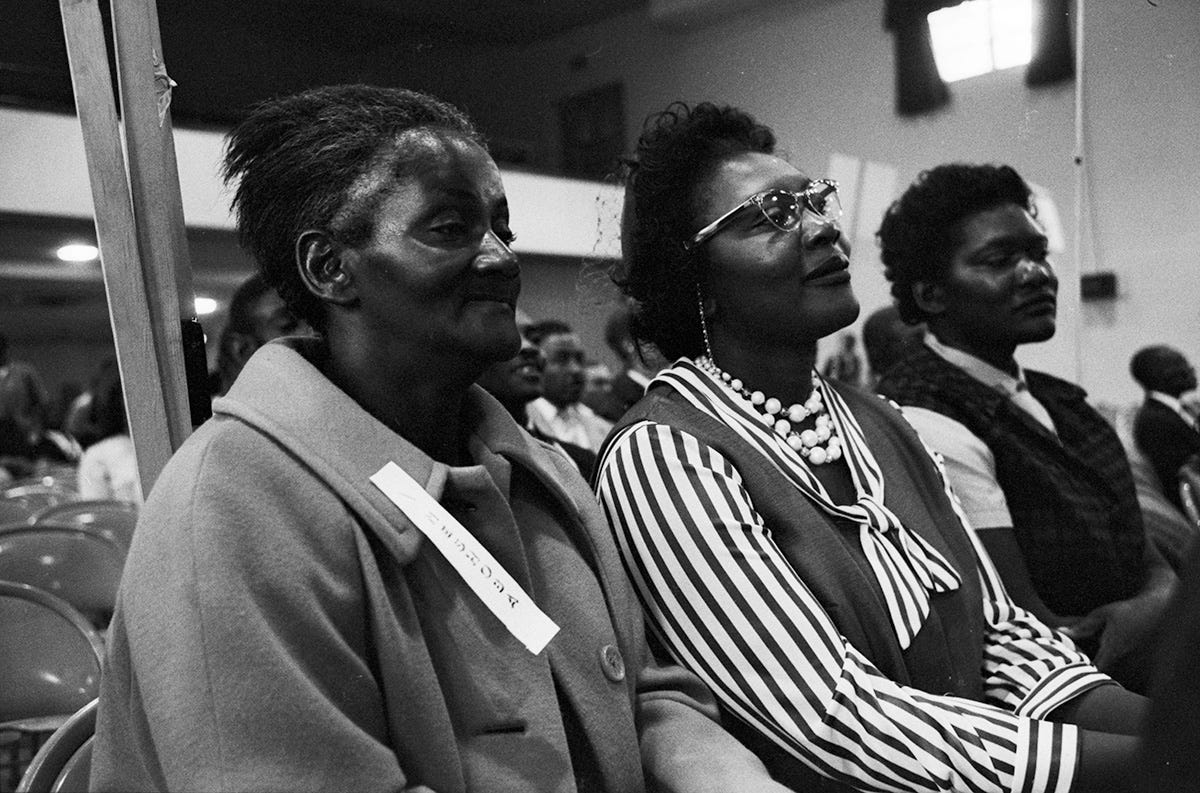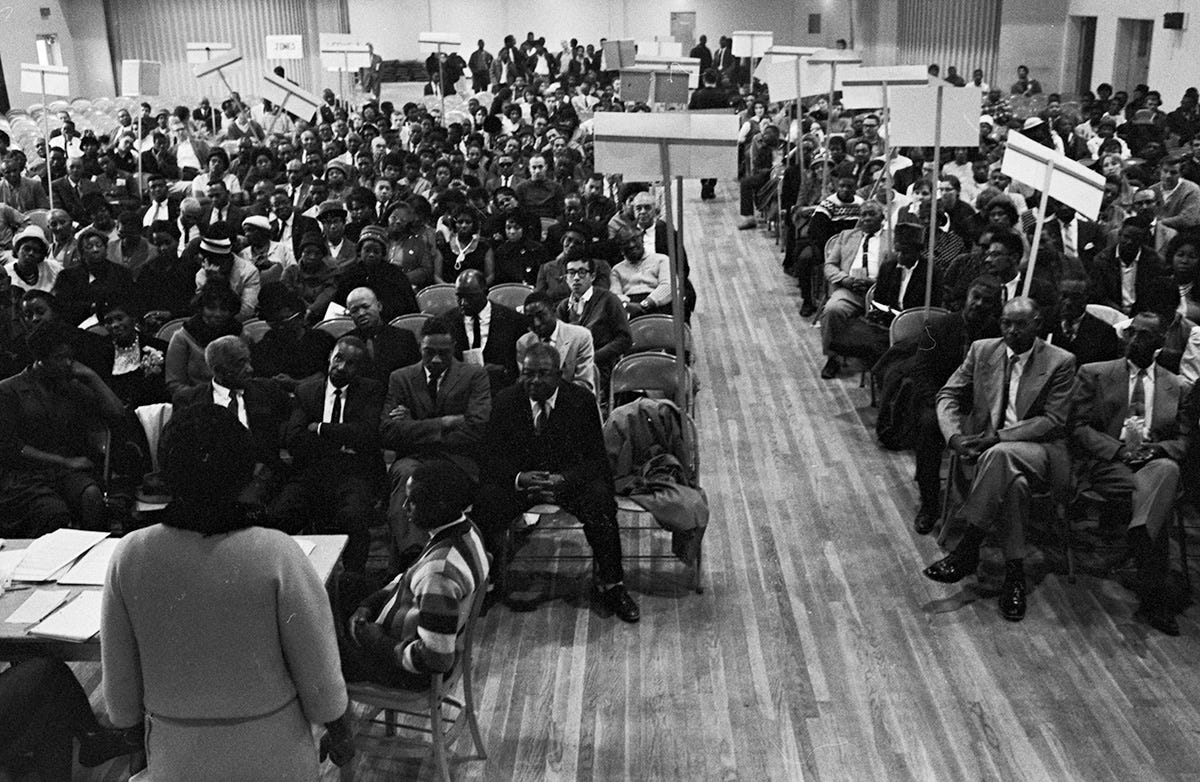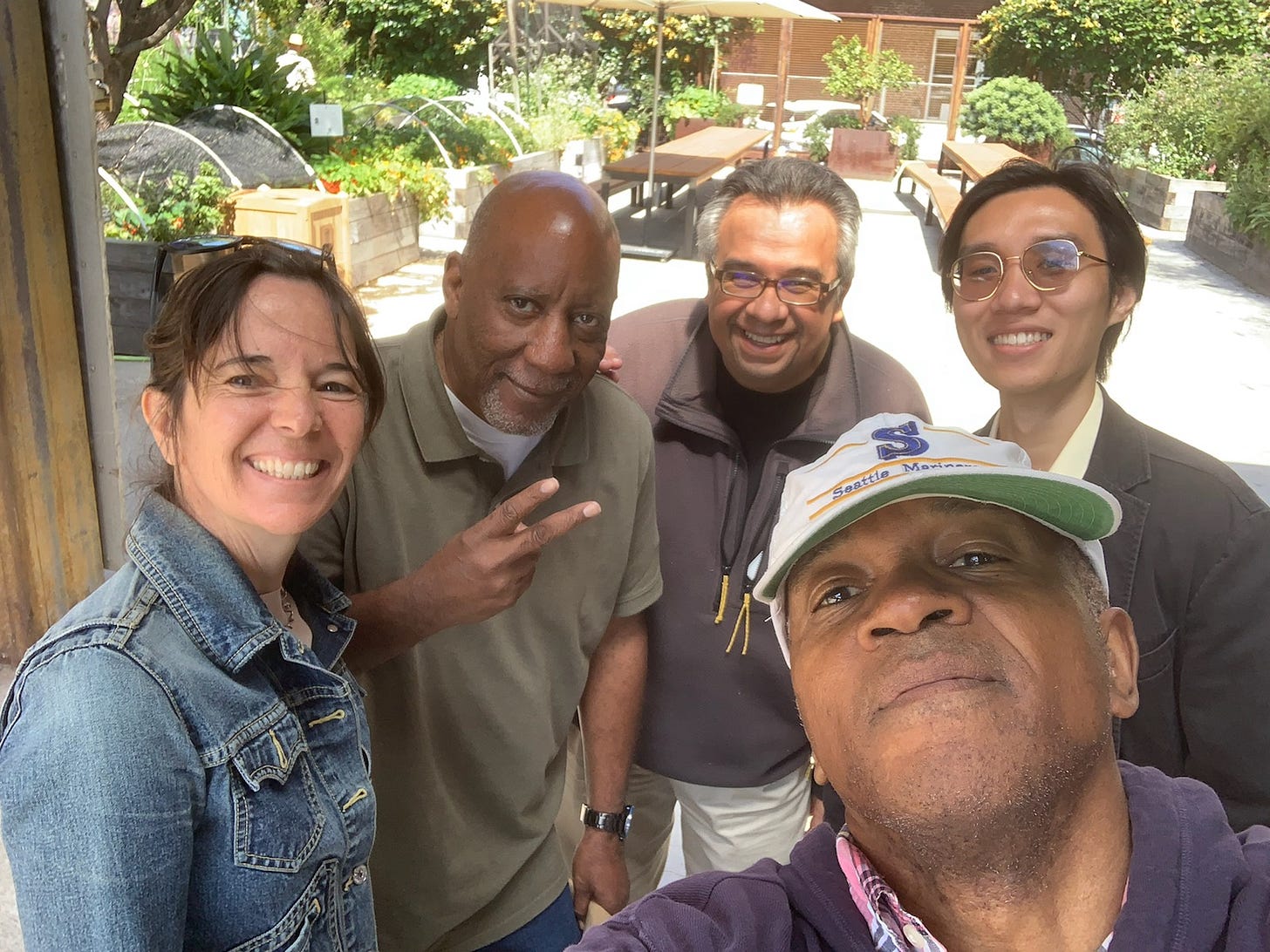This year, we celebrate the 60th anniversary of the founding of the Mississippi Freedom Democratic Party (MFDP) with a series of photographs by John Kouns, who documented Dr. King’s visit on July 25 and the party’s state convention in Jackson on August 6, 1964. We also share our new episode of Emancipated, the center’s podcast, titled Youth Movement for Justice: The Student Nonviolent Coordinating Committee (SNCC) and Israel’s Black Panthers. Finally, LeRoy Chatfield's voice, synthesized with AI with permission, reads his Sidebar #9 "The NFWA Strike Fund—1966."
The Freedom Democratic Party
By José Luis Benavides
On April 26, 1964, the Mississippi Freedom Democratic Party (MFDP) was created in Jackson, the state capital, at a rally of 200 people. MFDP, according to Bob Moses, “represented in its humble birth a truly democratic alternative to the whites-only state Democratic Party, and it had a brief moment on the national political stage at the Democratic Party Convention in Atlantic City, New Jersey, in August 1964.” When the MFDP was created, only 7 percent of Mississippi’s 450,000 African Americans eligible to vote were registered.
The MFDP slowly built its membership and organized parallel precinct, county, and regional meetings. On Wednesday, July 22, it organized an event in Jackson’s Masonic Temple with Dr. Martin Luther King Jr. According to a report by the Mississippi Free Press, an overflowing crowd of about 3,000 people braved an electric storm and sporadic showers to attend the event. The Mississippi Free Press reported: “Bob Moses told the crowd that the Freedom Democratic Party grew out of the Negro's need for some place to turn politically in a state where both National parties excluded him.”

Donna Richards Moses followed her husband and told the people all citizens have a right to choose their leader. Citizenship should be the only yardstick for measuring the right to vote, not literacy tests. "Nobody has a right to select your leaders," she said, "only you have that right.”

Dr. Martin Luther King, Jr. told the people to register with the MFDP. It provided the best way to break down the barriers to official registration of voters. The voter registration rate in Mississippi at the time would have required 135 years to register half of those eligible to register. "We are here because we are tired of humiliation and we will accept it no longer,” he said.

State Convention in Jackson
The Masonic Temple in Jackson, Mississippi, was where 2,500 people attended the MFDP’s state convention on August 6, 1964. “It was a beautifully-organized, crowded, singing assembly of laborers, farmers, housewives, from the farthest corners of Mississippi, and made the political process seem healthy for the first time in the state’s history,” wrote historian Howard Zinn. “It was probably as close to a grass roots political convention as this country has ever seen.”
The convention was an excellent example of Ella Baker’s political praxis, called local Black democratic perfectionism by Eddie Glaude Jr. in his recent book We Are The Leaders We Have Been Looking For, with “the emergence of an indigenous cadre of leaders capable of finding salvation in and for themselves.” For the convention’s participants, their county signs were not only a symbol of their pride and leadership but also a testament to their courage in the face of state-sanctioned racial terror.

The convention took place only two days after the bodies of James Cheney, Andrew Goodman, and Michael Schwerner were discovered 44 days after their brutal murder by nine white men, including the Neshoba County Sheriff. The three victims were part of the efforts of the Council of Federated Organizations (COFO) and the Congress of Racial Equality (CORE) to register voters.

The black newspaper Mississippi Free Press reported on August 1, a list of recent incidents of harassment and intimidation. A sample of these items included the bombing of the home of a couple hosting a Freedom Registration picnic in McCombs County, tear gas thrown into a house where Summer Project volunteers stayed in Batesville, and the bombing of two MFDP leaders in Hattiesburg.
The convention elected a 68-person delegation to travel to Atlantic City as representatives of the MFDP. Ella Baker delivered the keynote speech full of determination, sensitive to the agony of the families of the victims, but underscoring the lower value placed on the lives of African Americans in a white society: “Until the killing of black mothers’ sons is as important as the killing of white mothers’ sons, we who believe in freedom cannot rest.” She also believed that, whether recognized in Atlantic City or not, the Freedom Democratic Party would grow to be a powerful political arm of the movement in Mississippi.

Emancipated: Youth Movements for Justice
By Marta Valier
In this episode, Youth Movement for Justice: The Student Nonviolent Coordinating Committee (SNCC) and Israel’s Black Panthers, we discuss two youth movements for justice and equality with María Varela and Elia Asaf-Shalev, who visited us at the Bradley Center last April. Varela, a photographer and organizer with the Student Nonviolent Coordinating Committee (SNCC), shares her 1960s experiences in the American civil rights movement, highlighting the role of young people in securing voting rights through organizing and protests. Asaf-Shalev, author of the book Israel Black Panthers, explains how Moroccan Jews founded the Israeli Black Panthers in the 1970s to protest racial and ethnic inequalities in Israel. Join us to explore these stories of resistance and change.
This episode was produced by CSUN journalism students in the Multiplatform Storytelling J325 class, with production facilitated by instructor Marta Valier.
It was written by Cindy Chavez, Jay Kuklin, Brittney Ornelas, Tony Santos, Sulor Garretson, Chelsea Corry, Krystal Guevara, and Marta Valier. George Camacho, Charlie Gonzalez, and Marta Valier edited the audio. Thanks to Michael Akinfemi, Sophia Cano, Laura Gonzales, Kevin Khachatryan, Ariana Nassir, Melany Rizo, Ryan Romero, Breanna Small, Ayanna Smith, and Anthony Tedesco.
Sidebar #9: The NFWA Strike Fund—1966
LeRoy Chatfield's voice, synthesized with AI with permission, reads his Sidebar #9 "The NFWA Strike Fund—1966." The sidebar describes how after successful fundraisers in Los Angeles, Chatfield helped develop the Co-Op movement to provide services for the farmworkers and their families. Besides John Kouns's and Emmon Clarke's photographs, this video uses additional photographs courtesy of Chatfield's archive at CSUN. Editor: Brandon Lien. © Tom and Ethel Bradley Center.
Have a nice summer!








Excellent work here